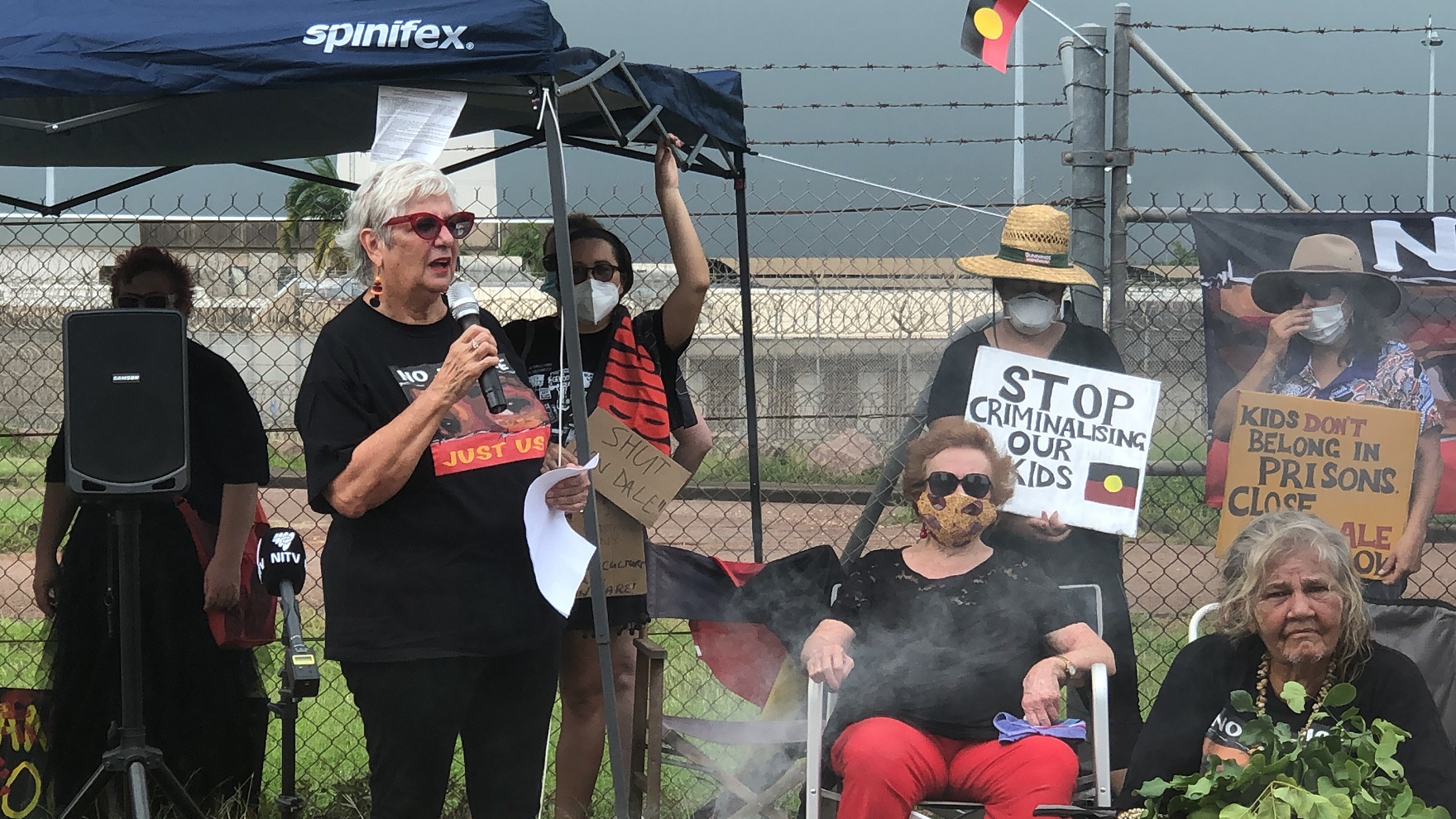
“Nobody would want their children in there,” Josie Crawshaw told a 150-strong Invasion Day protest outside Don Dale Youth Detention Centre (DDYDC). “So why is there indifference? Why is there silence?”
DDYDC is not a purpose-built juvenile facility: it is a decommissioned adult jail built in the 1970s. Aboriginal children, most of whom are on remand, are detained in cells measuring 2 metres by 3 metres and, in recent times, have endured periods of solitary confinement for more than 20 hours a day because of staffing problems.
In the Northern Territory, children as young as 10 years old can be jailed.
Dr Paul Bauert, senior paediatrician and Fellow of the Australian Medical Association, told the protest that prolonged detention, under alienating conditions, could permanently impair a child’s mental health.
“Virtually all of them will already be damaged,” Bauert said. “They are in need of trauma-informed counselling and help and staying behind those wires is just continuing a downward spiral.”
One of the recommendations from the 2016–17 Royal Commission into the Protection and Detention of Children in the NT was to close down DDYDC .
Since the Commission’s final report four years ago, the facility not only remains operational but, last June, the NT Labor government committed $2.5 million to its expansion.
This followed amendments to the Bail Act and the Youth Justice Act, which made it harder for children to access bail. The amendments were rushed through without consultation and despite protests by Aboriginal organisations, such as Danila Dilba Health Services and Aboriginal members of the NT Labor Party.
These “reforms” have meant a steady rise in the number of Aboriginal children detained in DDYDC. By last November, the centre was holding the highest number of children since the royal commission’s findings.
“The NT government has gone back on its word, reversing bail laws and putting more children in detention,” Yingiya Mark Guyula, the only Aboriginal Independent Member of the NT Legislative Assembly, said in a statement read out by Donna Hunter, grandmother of an 11-year-old who has been detained in DDYDC.
“They have not come out onto Country and out into communities to sit down with elders and leaders and ask us how it should be done,” he said.
The government launched its flagship Aboriginal justice policy, the Aboriginal Justice Agreement 2021–2027 (AJA), last August. It aims to reduce the incarceration rate of Aboriginal people over seven years. The AJA bills itself as a new model of partnership with Aboriginal people, committing itself to “ongoing dialogue and cooperation” and emphasising the need for “mutual respect” between the government and Aboriginal people.
Some no longer have any faith in the government’s willingness, or ability, to deliver.
“You told the Aboriginal people in the NT that your party was the best for us,” Natalie Hunter, family support practice manager based in Tennant Creek, told the rally. “We gave you our votes and you have let us down. Instead of working towards a common goal regarding Aboriginal children, you have excluded our input and refused to work with us.”
The NT Aboriginal Justice Agreement does not commit to close DDYDC, nor to raise the age of criminal responsibility — two key royal commission recommendations.
Some are now calling for an end to the politics of “consultation” and “engagement” in favour of direct action. “We are worse off now than we have ever been and I despair,” said Crawshaw, who has spent decades working in Aboriginal affairs, including as a former Aboriginal and Torres Strait Islander Commissioner. “That’s why our group has decided that we will do civil disobedience. We are here to take on this brutal regime that has shackled our kids’ lives. There’s no use talking.”
John Lawrence SC, who represents an 11-year-old child who has spent several weeks in DDYDC over the past two months and who appeared before the royal commission representing one of the children who was teargassed in 2014, said that the time for collaboration with the government is over.
“I’ve been President of the NT Bar Association, Director of the Law Council of Australia, President of the Criminal Lawyers Association,” said Lawrence. “I’ve sat around that table, I’ve been in those meetings. I’ve been part of that policy of acquiescence, which starts with not demonstrating, which starts with not saying ‘I disagree’.
“We’ve been doing that now for the best part of 30 years and look where it’s got us. Now it’s time to start taking real action so that we can obtain justice.”
Lawrence challenged the territory's Chief Minister Michael Gunner and Attorney-General Selena Uibo to a public debate. “It’s about time this ‘tough-on-crime’ issue was debated by people on both sides in an open forum.”
The Invasion Day demonstration is the sixth such protest of the Close Don Dale Movement, which began with a gathering on Christmas morning outside the gates of DDYDC .
The movement is demanding that DDYDC be immediately closed and that comprehensive, trauma-informed support for Aboriginal children, provided by Aboriginal organisations, be provided.
“Transition all children out of prison within a year by creating a trauma-informed school or healing places that are culturally appropriate done our way,” Hunter said. “It can be done and needs to be done.”
darwin_invasion_day_featuring_josie_crawshaw_credit_stephen_w_encisco.jpg

“These kids will be shackled for the next three to four decades,” said Crawshaw. “Their lives will never recover. We’ve got to close this place down and we’ve got to get some really good trauma services.”
[The Close Don Dale Movement will meet every Friday at 5pm outside the gates of DDYDC until it is closed down. Get involved here.]